Activities and Learning
How to Stimulate Baby Brain Development: Expert Tips
Kickstart your baby's brain development with expert tips on reading, talking, sensory play, routines, social interactions, and interactive environments.
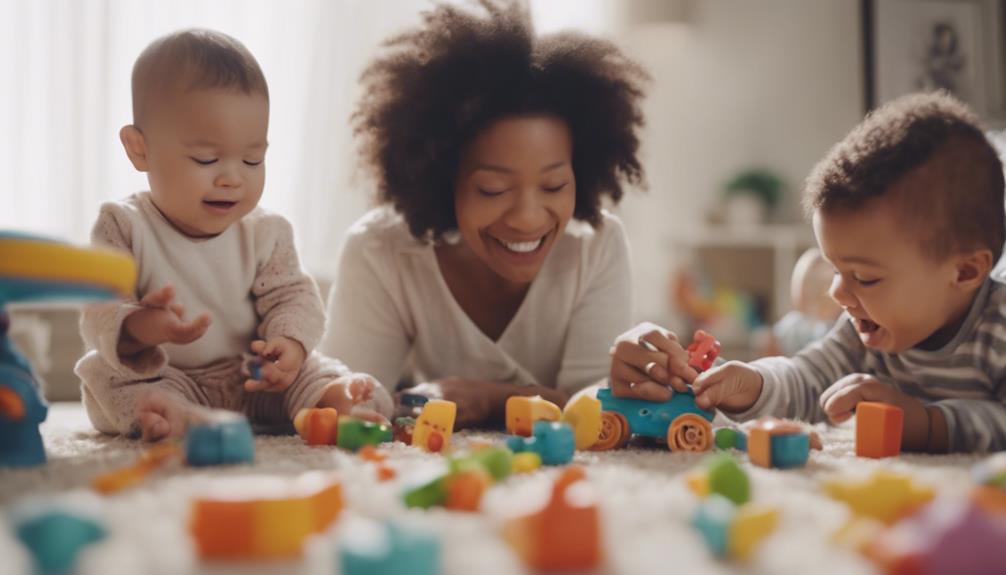
To enhance baby brain development, prioritize reading, talking, sensory play, routines, positive social engagements, and interactive environments. Expert advice strongly advocates these methods. Reading and talking introduce new words, enhancing language skills. Sensory activities boost cognitive skills through varied textures and sounds. Consistent routines provide security and emotional stability. Positive social interactions foster social cues recognition. Serve and return interactions encourage language development. A stimulating environment with interactive play enhances curiosity. Implementing these strategies creates an ideal environment for your baby's brain growth.
Key Takeaways
- Read and talk to your baby daily to enhance language skills and cognitive development.
- Provide sensory exploration opportunities with various textures and materials for brain connections.
- Establish a consistent routine to promote security, reduce stress, and aid cognitive development.
- Foster positive social interactions for emotional connections and healthy brain development.
- Engage in serve and return interactions through conversations to support language skills and neural connections.
Reading and Talking
Reading and talking to your baby regularly is crucial for stimulating their brain development. By engaging in these activities, you're helping your baby in language acquisition and cognitive development. According to experts, babies exposed to a variety of words early on tend to have stronger language skills later in life. When you read to your baby, you're introducing new words, sounds, and concepts that aid in their overall brain development.
Similarly, talking to your baby not only promotes language acquisition but also encourages social interaction and emotional bonding.
Research has shown that the more words a baby hears, the better their language skills become. Dr. Smith, a renowned child psychologist, states, 'Reading and talking to babies from a young age lays a solid foundation for their language development and instills a love for learning.' As a result, make it a habit to read books and have conversations with your baby to support their cognitive growth and nurture a strong parent-child bond.
Sensory Exploration

When it comes to sensory exploration with your baby, engaging in activities that stimulate their senses is essential.
Providing various textures, shapes, and materials for exploration can greatly enhance their sensory development.
These experiences help your baby make important brain connections and develop vital cognitive skills.
Engaging Sensory Activities
Exploring various sensory activities with your baby can play an essential role in stimulating their brain development. Engaging in sensory exploration, such as feeling different textures or playing with water, can enhance cognitive skills by introducing babies to various scents, sounds, and tastes. Providing sensory toys like rattles, musical instruments, and soft fabrics not only engages their senses but also promotes brain growth. Sensory play is important for developing fine motor skills as babies grasp, touch, and manipulate objects of different shapes and sizes. Through multi-sensory experiences, babies foster curiosity, exploration, and cognitive development.
To help you understand the significance of engaging sensory activities, consider the following table:
| Sensory Activities | Benefits | Examples |
|---|---|---|
| Feeling textures | Stimulates brain development | Soft fabrics, rough surfaces |
| Playing with water | Enhances cognitive skills | Splashing, pouring |
| Exploring scents | Engages sensory perception | Aromatherapy, scented toys |
Promoting Cognitive Growth
To further enhance your baby's cognitive growth, consider incorporating sensory exploration activities that stimulate their developing brain. Engaging in sensory play with various textures and materials can have a profound impact on your child's cognitive development.
According to child development experts, offering cause-and-effect toys can help infants build problem-solving skills and enhance their cognitive abilities. Additionally, gentle massages provide sensory experiences that aid in your baby's cognitive development by promoting relaxation and increasing body awareness.
Introducing different scents for your baby to explore can also support their sensory and cognitive development, as they learn to distinguish between various smells and make connections with their environment.
Enhancing Brain Connections
Engage your baby in sensory exploration activities to enhance brain connections and stimulate multiple senses simultaneously. By providing a variety of textures, sounds, and scents, you can promote brain development in different areas.
Sensory play is essential for cognitive development as it allows babies to learn through touch, sight, and sound, aiding in the formation of neural pathways. Encouraging your little one to explore various sensory experiences supports the intricate network of brain connections necessary for learning and understanding the world around them.
Introduce different textures through playtime activities.
Incorporate various sounds to stimulate auditory senses.
Use scented items or foods to engage the sense of smell.
Offer tactile experiences like finger painting or exploring different materials.
These sensory experiences not only entertain your child but also play a crucial role in shaping their brain development and fostering cognitive growth.
Consistent Routine

Establishing a consistent routine for your baby is essential for promoting their sense of security and aiding in brain development. By structuring your child's time with a predictable routine, you're providing a foundation that supports their cognitive development and emotional well-being.
Regular schedules for feeding, napping, and playtime help babies learn patterns and establish healthy habits. According to experts, predictable routines can reduce stress and anxiety in babies, creating an ideal environment for brain growth. Consistency in daily activities like bedtime and mealtimes further contributes to cognitive development and emotional stability.
Dr. Smith, a child psychologist, emphasizes the importance of routines, stating, 'A consistent routine helps babies feel secure and understand the world around them.' Additionally, establishing a routine can enhance parent-child bonding and communication, which ultimately fosters a strong foundation for your baby's brain development.
Stick to a consistent schedule to provide your baby with the stability they need for healthy growth.
Positive Social Interactions

Fostering positive social interactions with your baby is essential for stimulating their brain development. Engaging in meaningful conversations, making eye contact, and responding to your baby's cues all play a significant role in enhancing their learning abilities.
Here are some key points to keep in mind when promoting positive social interactions with your little one:
- Emotional Connection: Creating a strong emotional bond with your baby through positive interactions is critical for their overall brain development.
- Learning Through Engagement: Babies learn best through interaction, so make sure to engage in activities that promote back-and-forth communication.
- Understanding Social Cues: Positive social interactions help babies recognize and understand social cues, setting the foundation for healthy social development.
- Building Secure Attachments: Quality time spent with caregivers strengthens the bond between parent and child, leading to secure attachments that are essential for a baby's emotional well-being.
These interactions not only shape your baby's social skills but also contribute significantly to their cognitive and emotional growth.
Serve and Return Interactions

When interacting with your baby, remember to engage in conversations and encourage responsiveness.
By responding enthusiastically to their cues, such as babbling or pointing, you're actively shaping their brain development.
These serve and return interactions play an important role in fostering language skills, social connections, and emotional bonds with your little one.
Engage in Conversations
Engaging in conversations through serve and return interactions is an essential way to promote your baby's brain development. By actively participating in these interactions, you're fostering strong neural connections in your baby's brain, which are vital for their overall growth and development.
Here are some key points to keep in mind when engaging in conversations with your baby:
- Respond promptly to your baby's cues during conversations to create a supportive environment for their language development.
- Conversations with babies provide valuable opportunities for cognitive growth as they learn to process and respond to different stimuli.
- Serve and return interactions help build the foundation for strong neural connections in your baby's brain, supporting their learning and understanding of the world around them.
- Talking to babies in a responsive and engaging manner not only aids in cognitive development but also promotes their social and emotional well-being.
Encourage Responsiveness
How can you promote healthy brain development in infants through interactive exchanges known as serve and return interactions?
Serve and return interactions involve responding promptly and engagingly to a baby's cues, creating a back-and-forth exchange that helps build essential neural connections in the child's brain.
According to the Harvard University Center on the Developing Child, these interactions are 'like a game of tennis: the 'back and forth' of these interactions is the cornerstone of healthy brain development.'
Engaging in these developmentally appropriate exchanges from the first days of a child's life can have a profound impact on their cognitive abilities.
Stimulating Environment
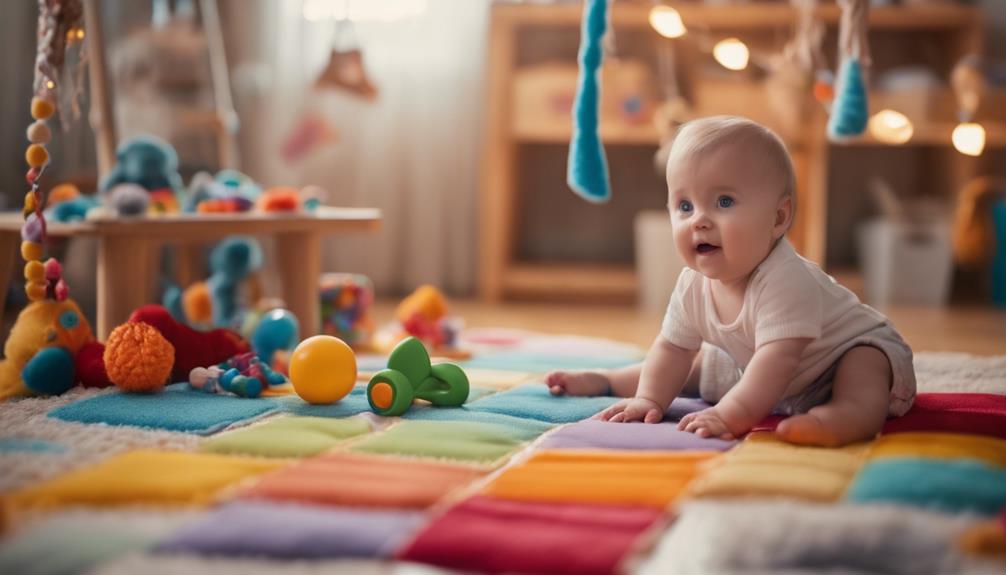
Creating a vibrant environment for your baby involves introducing age-appropriate toys and activities that engage their senses. To stimulate your baby's brain development effectively, consider the following:
- Provide a variety of sensory experiences: Incorporate different textures, sounds, and colors into your baby's environment to promote cognitive skills and emotional well-being.
- Offer interactive play opportunities: Engage your baby in activities that encourage exploration and curiosity while ensuring a beneficial setting for their development.
- Maintain a calm and nurturing atmosphere: Creating a soothing environment supports emotional well-being, which is essential for the best brain growth.
- Foster a strong parent-child bond: Through simple games, music, and interactive reading sessions, you can enhance cognitive skills and strengthen the bond between you and your baby.
Frequently Asked Questions
How Can I Stimulate My Baby's Brain Development?
To stimulate your baby's brain development, engage in one-on-one interactions through talking, playing, and reading. Avoid excessive screen time and opt for interactive activities. Choose age-appropriate toys and activities that encourage curiosity, interaction, and skill development.
What Are 3 Ways That You Can Increase the Development of an Infant's Brain?
Interact one-on-one with your infant by talking, playing, and reading. Avoid passive activities like TV. Create a supportive, loving environment to reduce stress. Foster emotional connections through nurturing interactions. Encourage exploration, curiosity, and engagement.
How Can I Stimulate My Baby's Cognitive Development?
To stimulate your baby's cognitive development, engage in interactive activities like peekaboo and stacking blocks. Read aloud, sing songs, and describe daily activities. Provide age-appropriate toys for exploration and problem-solving. Encourage cause-and-effect play with toys like shape sorters.
How to Increase IQ Level of Baby?
To increase your baby's IQ level, engage in interactive activities like talking, singing, and reading. Provide a nurturing environment for emotional well-being. Encourage sensory exploration with toys. Offer varied stimulation with colorful toys, music, and textures. Maintain a balanced diet for cognitive development.
Conclusion
To sum up, fostering a baby's brain development is essential for their overall growth and learning potential. By engaging in activities such as reading, sensory exploration, and positive social interactions, you can help create a strong foundation for their future cognitive abilities.
Remember, as the saying goes, 'A child's mind is like a sponge, ready to soak up new experiences and knowledge.' So, be sure to provide a stimulating environment that encourages their curiosity and exploration.
Games and Playtime
Playing Baby: Top Activities for Development
Leverage these top activities for your baby's development to enhance their skills and growth in exciting ways.

Engage your infant in a variety of activities to encourage their development and growth. For newborns, consider using gentle rocking to strengthen the bond. When they reach one month old, introduce high-contrast patterns to stimulate their vision. Between 2-3 months, talking and toys can help develop their language skills and auditory senses. As they grow from 6-12 months, sensory play and music can enhance their coordination. For toddlers aged 12-18 months, focus on fine motor skills and creativity. Interactive games can also improve cognitive and social skills. Sensory play is beneficial for their senses and cognitive abilities. By incorporating these activities, you can effectively nurture your baby’s overall development. Further tips are available to help optimize your child’s growth and skills.
Key Takeaways
- Engage in interactive games to foster cognitive and social skills.
- Incorporate sensory play for fine motor skills and cognitive development.
- Use music and movement activities to boost coordination and language skills.
- Encourage tummy time for physical development and muscle strengthening.
- Provide high-contrast patterns and gentle sounds for visual and auditory stimulation.
Newborn Activities
Engage your newborn in simple activities like gentle rocking to soothe them and promote bonding during their early stages of development. Newborns, who sleep an average of 14-17 hours a day in short segments, benefit greatly from these calming interactions. Their vision, limited to objects about 8-10 inches away, makes close contact essential for their cognitive and emotional growth. Swaddling and holding your newborn close provide comfort and security, aiding in their overall development.
Activities such as gentle rocking not only soothe your newborn but also help in establishing a strong bond between you and your baby. Skin-to-skin contact is another vital activity that helps regulate their temperature and promotes breastfeeding. These simple yet powerful interactions play an important role in laying the foundation for your newborn's growth and well-being.
Activities for 1 Month Old
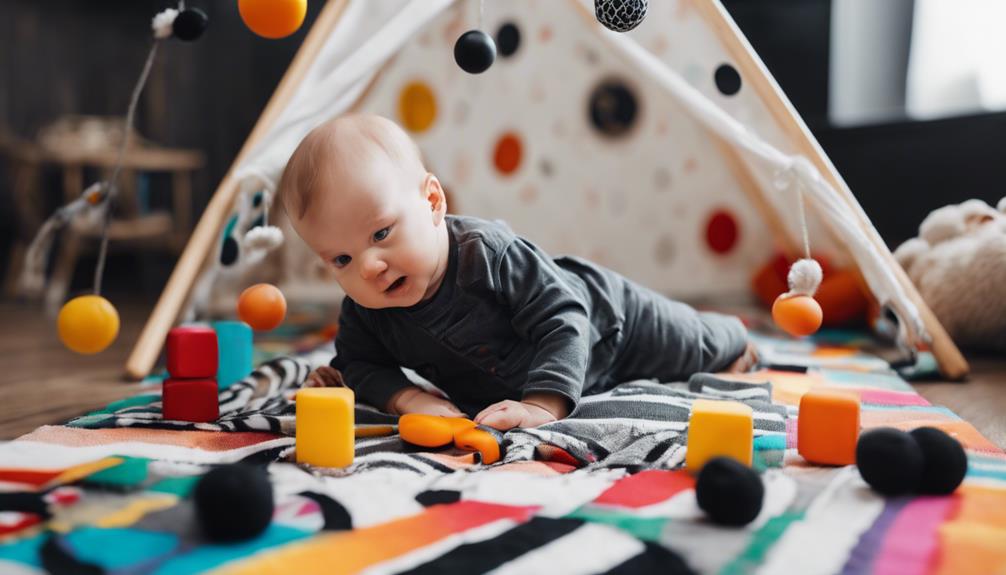
Your 1-month-old baby is starting to show early signs of development through smiling and making cooing sounds.
To aid in their growth, engaging in visual stimulation techniques with high-contrast patterns and bright colors can captivate their attention.
Additionally, incorporating tummy time exercises will help strengthen their neck muscles and advance their motor skills.
Visual Stimulation Techniques
Enhance your 1-month-old's visual development with high-contrast black and white patterns and simple, bold images. These visual stimulation techniques are essential for your baby's growing eyesight and cognitive abilities.
Here are three ways to engage your little one effectively:
- Use high-contrast black and white patterns:
Opt for toys, books, or even homemade cards with bold black lines on a white background to captivate your baby's attention. These patterns help stimulate their visual receptors and enhance their focus.
- Introduce simple, bold images:
Incorporate images of basic shapes like circles, squares, and triangles to aid in visual tracking and recognition. These uncomplicated visuals are ideal for your baby's developing vision.
- Utilize contrasting colors:
Mobiles or toys with bright, contrasting colors can aid in distinguishing different shades and hues. This exposure to varied colors can enrich your baby's visual perception and stimulate their neural connections effectively. Remember, a well-lit environment is essential for the best visual stimulation at this age.
Tummy Time Exercises
Strengthen your 1-month-old's neck muscles through tummy time exercises, an important activity for their early development. Tummy time plays a vital role in achieving developmental milestones and promoting motor skills in babies.
Begin with short sessions of tummy time, gradually increasing the duration as your little one becomes more comfortable and stronger. This exercise not only helps prevent flat spots on the baby's head but also encourages neck muscle development.
During tummy time, place colorful toys or mirrors in front of your baby to stimulate reaching and provide visual engagement. This encourages your baby to lift their head, promoting stronger neck muscles.
Remember, supervision is key during tummy time to make sure your baby's safety and comfort. By incorporating tummy time exercises into your daily routine, you're setting a strong foundation for your baby's physical development and motor skills.
Enjoy this bonding time with your little one while supporting their growth and well-being.
Sensory Play Ideas
Explore sensory play ideas for your 1-month-old to stimulate their developing senses and promote early engagement with the world around them.
Here are some activities to help your baby's sensory development:
- Soft Textures: Provide your baby with different soft fabrics to touch and feel, such as a smooth blanket or a plush toy. These textures can help in sensory exploration and tactile stimulation.
- Gentle Touches: Engage your baby with gentle touches on their skin, like softly stroking their arms or gently massaging their feet. This can promote bonding and sensory awareness.
- Light and Sound Stimuli: Introduce subtle light patterns or soft sounds like gentle music or nature sounds to captivate your baby's developing senses. These stimuli can help in stimulating their auditory and visual senses at this early stage.
Engaging in sensory play with your 1-month-old can create meaningful interactions and support their sensory development in a nurturing way.
Activities for 2 Month Old
What activities are beneficial for a 2-month-old's development?
At 2 months old, babies are beginning to explore the world around them. Engaging in activities that involve talking, singing, and reading can help build your baby's language skills. Encourage your little one to track moving objects to enhance their visual abilities. Providing toys that make gentle sounds can stimulate their auditory senses, aiding in their sensory development.
Additionally, offering plenty of tummy time is vital at this stage. Tummy time not only helps to strengthen your baby's neck muscles but also promotes motor skills development. It's essential to supervise tummy time to make sure the baby's safety.
Activities for 3-6 Months
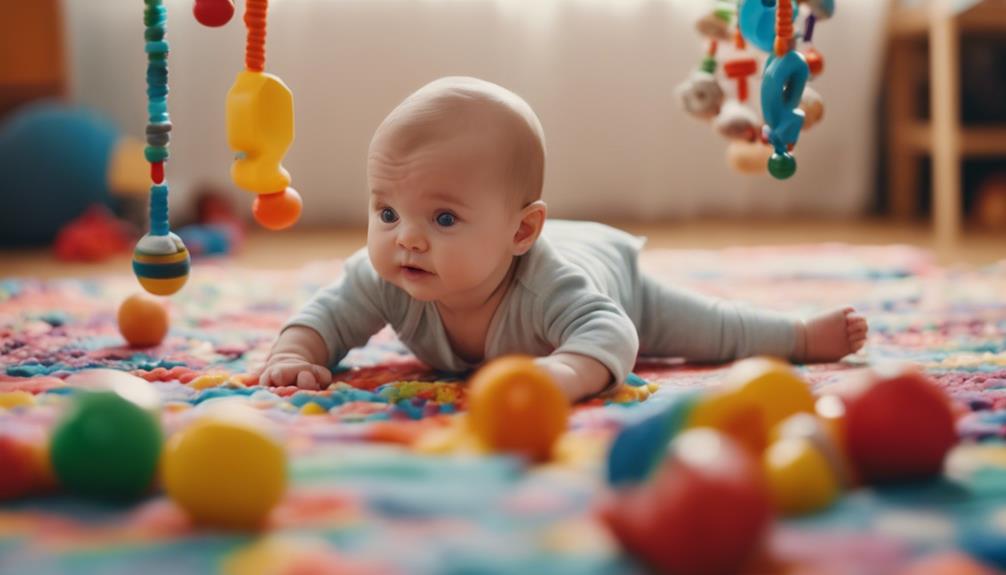
Engage your baby in simple activities like talking, singing, and using playmats to support their sensory and cognitive development between the ages of 3 to 6 months. These activities are vital for nurturing your little one's language skills, fine motor skills, and overall growth during this exciting stage of development.
Here are three play ideas to incorporate into your routine:
- Tummy Time Fun: Encourage tummy time to help your baby strengthen muscles and develop head control. Use colorful toys or mirrors to keep them engaged during this essential exercise.
- Grasping Games: Provide safe toys that your baby can grasp and explore with their hands and feet. This will help enhance their fine motor skills and hand-eye coordination.
- Interactive Singing: Sing songs with motions and engage in playful activities like tracking moving objects. These interactions stimulate visual and auditory development while fostering a strong bond with your baby.
Activities for 6-12 Months

As your baby enters the 6-12 months stage, engaging in sensory play can help them explore different textures and stimulate their senses.
Tummy time benefits are essential during this period as it supports your baby's physical development and strengthens their muscles.
Introducing music and movement activities can also foster your baby's coordination and rhythmic skills at this age.
Sensory Play for Infants
Sensory play activities for infants aged 6-12 months are essential for stimulating their developing senses of touch, sight, and sound. Engaging in sensory play allows infants to explore the world around them in a hands-on manner, aiding in their cognitive development.
Here are three sensory play activities that can help infants in their sensory exploration journey:
- Texture Exploration: Provide infants with various textured objects like soft fabrics, rough sandpaper, or bumpy toys to touch and feel. This activity helps them distinguish between different textures and enhances their tactile sensitivity.
- Water and Sand Play: Allowing infants to play with water and sand can be a delightful sensory experience. The sensation of wetness, the movement of water, and the texture of sand can captivate their senses and encourage exploration.
- Sound Discovery: Introduce infants to different sounds such as musical toys, rattles, or nature sounds. This activity not only stimulates their auditory senses but also helps them recognize and differentiate between various sounds in their environment.
Tummy Time Benefits
Enhance your baby's neck, back, and shoulder muscles with tummy time activities designed for infants aged 6-12 months. Tummy time plays a vital role in promoting motor skills and physical development in your little one.
By encouraging your baby to spend time on their tummy, you're helping them build the necessary muscles to support their head, back, and eventually aid in crawling and walking. Additionally, tummy time can prevent flat spots on the baby's head, a common concern in infants.
You can incorporate short tummy time sessions throughout the day to gradually increase your baby's tolerance and strength. This activity not only improves coordination and balance but also contributes to your baby's overall physical development.
Music and Movement
Engage your 6-12 month-old baby in music and movement activities to boost their coordination, balance, and motor skills. These activities not only enhance physical development but also contribute to their language development and rhythm recognition.
Here are three ways to incorporate music and movement into your baby's routine:
- Sing and Dance Together:
Singing songs and dancing with your baby can help them recognize patterns in music, improve language skills, and develop a sense of rhythm.
- Clap Along to Music:
Encourage your baby to clap along to music to enhance their fine motor skills and hand-eye coordination while enjoying the beat.
- Explore with Musical Instruments:
Introduce simple musical instruments like shakers or drums to stimulate your baby's auditory senses, promote exploration, and create a fun musical experience together.
Activities for 12-18 Months
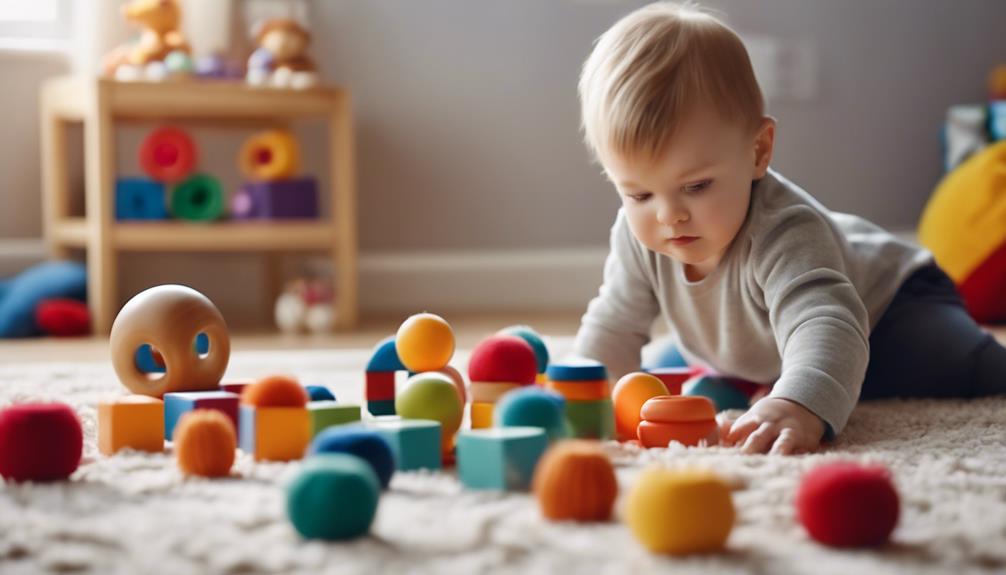
Introducing your little one to interactive games and play is crucial for fostering their overall development between 12 to 18 months of age. During this stage, it's important to build your baby's skills through various activities that encourage exploration and learning.
Engage in stacking activities to enhance their fine motor skills and hand-eye coordination. Introduce sensory play with materials like water, sand, or textured objects to stimulate their senses and encourage curiosity.
Encouraging role-play and imaginative play can help stimulate creativity and language development in your little one. Explore outdoor activities such as swinging and nature walks to promote physical development and foster their curiosity about the world around them.
Reading books together is also a great way to encourage language development, cognitive skills, and strengthen the bond between you and your baby. By incorporating these activities into your daily routine, you can support your baby's growth and development during this critical 12-18 month period.
Interactive Games
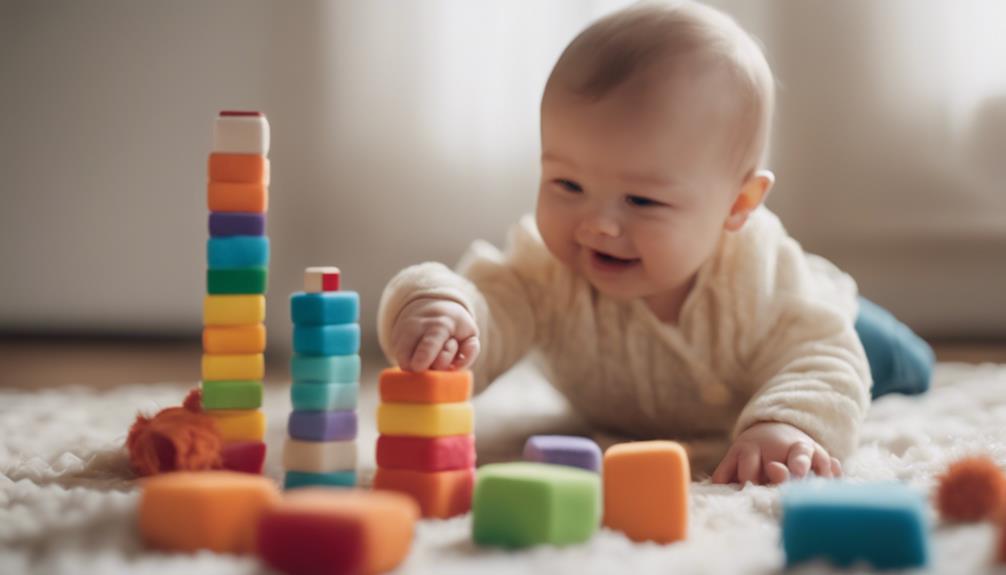
During the important developmental stage of 12-18 months, interactive games play a significant role in fostering your baby's cognitive, social, and sensory skills. Engaging in play not only provides entertainment but also serves as a powerful tool for your little one's growth.
Here are three ways interactive games can benefit your baby:
- Enhancing Cognitive Skills: Interactive games help stimulate your baby's brain, encouraging problem-solving abilities and memory retention. Activities like shape sorting or simple puzzles can aid in developing these essential cognitive skills.
- Promoting Social Interaction: Through games that involve turn-taking or imitation, your baby learns valuable social skills such as communication and cooperation. These interactions lay the foundation for future relationships and social development.
- Improving Motor Skills: Interactive games are excellent for enhancing your baby's motor skills and coordination. Activities like stacking blocks or playing with toys that require grasping and releasing movements can help your baby develop these vital physical abilities.
Incorporating interactive games into your baby's routine can have a profound impact on their overall development, making playtime not just fun but also beneficial for their cognitive, social, and motor skills.
Sensory Play

Sensory play involves activities that stimulate a child's senses, providing valuable hands-on experiences for infants and toddlers. Engaging in sensory play can have a significant impact on a child's development. By exploring different textures, colors, and sounds, children can enhance their fine motor skills and cognitive abilities. These developmental activities also play an essential role in language development, as children learn to associate words with sensory experiences.
Common sensory play materials, such as sand, water, play dough, textured objects, and musical instruments, offer a diverse range of stimuli for young children to engage with.
Through sensory play, children can't only boost their creativity and problem-solving skills but also improve their emotional regulation. Encouraging sensory play in daily routines can provide children with a fun and enriching way to learn about the world around them while fostering essential skills for their overall development.
Frequently Asked Questions
What Activity Is Key to All Areas of an Infant's Development?
Tummy time is the key activity for all areas of your infant's development. It strengthens muscles, improves motor skills, enhances sensory experiences, and lays the foundation for future milestones. Regularly engaging in tummy time supports your baby's growth and development.
What Is One Activity You Plan on Doing to Help Your Baby's Development?
You plan on incorporating sensory exploration activities like playing with textured materials to stimulate your baby's cognitive development. It's a fun and engaging way to help them explore their senses and learn about different textures.
How Do You Play With a Baby for Development?
To nurture development, interact with your baby through play. Engage in activities like peekaboo for sensory awareness, sing songs for language skills, and encourage exploration. Let the fun flow, and watch those little minds grow!
What Does Playing With Babies Teach Children?
Playing with babies teaches you about empathy, social skills, fine motor skills, cause and effect relationships, creativity, imagination, and language development. Engage in interactive play to enhance your understanding of these key aspects of development.
Conclusion
In summary, engaging in developmentally appropriate activities with your baby is essential for their growth and learning.
Just like a garden needs nurturing to bloom, your little one's brain needs stimulation to thrive.
So, whether you're playing peek-a-boo with a newborn or building blocks with a toddler, remember that these simple activities are laying the foundation for their future success.
Keep playing, keep bonding, and watch them blossom into amazing individuals.
Games and Playtime
Baby Camp Games: Engaging Activities for Babies
Mingle with your baby at Baby Camp Games for marvelous sensory adventures and motor skills development.

Explore exciting sensory activities, imaginative play ideas, educational games, active play games, water play activities, sand exploration games, and music and dance activities at baby camp. Immerse your baby in an interactive world of fun that enhances cognitive, motor, and social skills. These activities offer valuable brain stimulation and support overall development. From shape sorters to movement-based games, each activity targets different aspects of growth. Water play and sand exploration provide sensory-rich experiences that enhance fine motor skills. Learn about the advantages of music and dance for language development and coordination. Discover a range of engaging activities for your baby at baby camp.
Key Takeaways
- Sensory exploration activities enhance cognitive and motor skills.
- Creative play ideas boost imagination and fine motor skills.
- Educational games foster interactive learning experiences.
- Active play games promote physical and cognitive development.
- Water and sand exploration games stimulate sensory awareness and creativity.
Sensory Exploration Activities
Engage your baby's senses with a variety of stimulating sensory exploration activities. These sensory activities are essential for your baby's development, as they help enhance cognitive, motor, and social skills. By playing with sensory bins, exploring different textures, and experiencing new sensations, your baby can set off on a journey of discovery and learning.
Sensory play isn't just fun but also critical for your baby's growth. According to Dr. Smith, a pediatrician specializing in child development, 'Sensory activities provide valuable stimulation for babies' brains, helping them make sense of the world around them.' From fluffy bins filled with various textures to musical activities that engage auditory senses, the possibilities are endless.
Creating a sensory-rich environment for your baby can have a significant impact on their overall development. Dr. Johnson, a child psychologist, emphasizes, 'Interactive sensory activities can create a stimulating environment where babies can learn and grow at their own pace.'
Creative Play Ideas

Explore a world of creativity with your baby through various play ideas that encourage imagination and skill development. Engaging in activities like building with playdough, exploring different painting techniques, or creating handprint and footprint art can enhance your baby's fine motor skills.
Additionally, imaginative play using toy kitchen sets, dolls, costumes, or props can stimulate creativity and social skills in babies.
Encouraging your baby to scribble with crayons, stick stickers, or play with sensory bins are enjoyable ways for them to express themselves while developing those essential fine motor skills. Playing house, talking through a tube for auditory discrimination, or fetching objects around the house can also be fun and educational activities that promote overall development in babies.
Educational Games
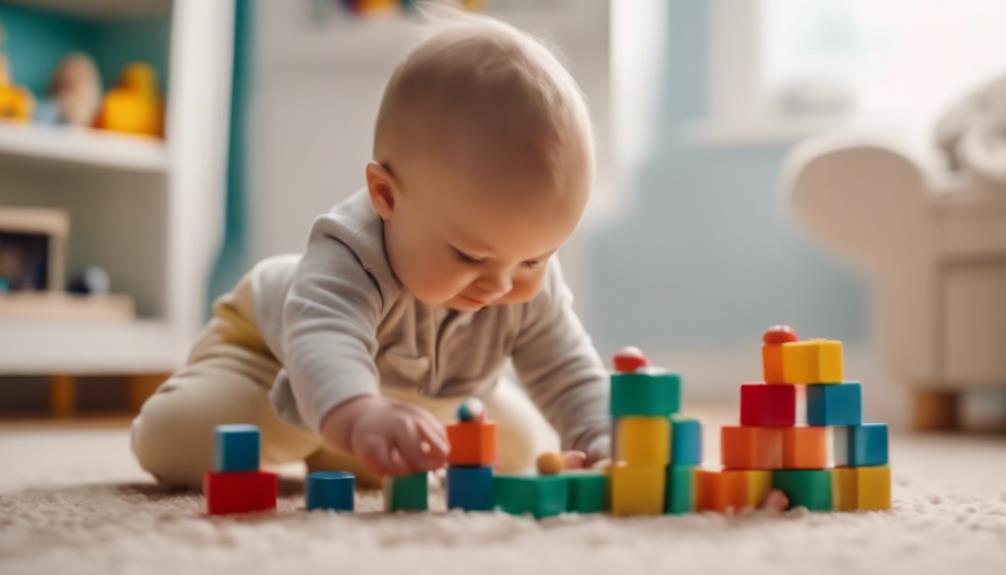
Educational games for babies offer interactive learning experiences that are essential for their development. Activities like shape sorters and stacking blocks provide developmentally appropriate challenges that encourage cognitive growth.
Interactive Learning Experiences
Enhance your baby's cognitive skills and stimulate brain development through interactive learning experiences with educational games. Indoor activities like shape sorters, puzzles, and matching games offer valuable opportunities for your little one to learn and explore their surroundings. These games not only entertain but also promote language and cognitive development in babies. According to child development expert Dr. Smith, 'Educational games provide a fun way for babies to engage with their environment and enhance their problem-solving skills.'
In addition to traditional games, reading board books with simple words and pointing out objects can also be educational and enjoyable for your baby. Dr. Johnson, a pediatrician, emphasizes the importance of interactive learning experiences, stating, 'Engaging in educational games from an early age can have a positive impact on a child's cognitive development.'
Developmentally Appropriate Activities
To engage your baby in developmentally appropriate activities that promote learning and growth, consider incorporating educational games designed to stimulate their senses and cognitive abilities. Developmentally appropriate activities for babies should focus on sensory exploration, fine motor skills development, cognitive growth, and social interaction.
These activities can include sensory bins, music exploration, texture play, and interactive games that promote learning and development. Educational games for babies should be engaging, age-appropriate, and specifically crafted to enhance their brain development, problem-solving skills, and social interactions.
Providing babies with a variety of these educational games can foster a love for learning, curiosity, and creativity from an early age. Engaging in developmentally appropriate activities not only entertains babies but also aids in their overall development, setting a strong foundation for future learning endeavors.
Active Play Games

When it comes to active play games for babies, you'll find a range of movement-based fun ideas, sensory play suggestions, and interactive music activities to keep your little one engaged and developing.
Rolling a soft ball back and forth can help with hand-eye coordination, while crawling through tunnels promotes sensory processing and gross motor skills.
Walking with a toy walker and climbing on soft play structures are excellent ways to build balance, coordination, and muscle strength in babies.
Movement-Based Fun Ideas
Get your baby moving and grooving with these engaging movement-based fun ideas at baby camp games. Activities like crawling through tunnels, walking with a toy walker, and rolling a soft ball back and forth can help your little one develop essential motor skills, coordination, and balance.
According to pediatric experts, these active play games not only promote physical well-being but also encourage muscle strength and flexibility in babies.
By incorporating movement-based games into your baby's routine, you're providing them with opportunities to explore their surroundings, interact with objects, and understand cause and effect relationships.
Dr. Smith, a child development specialist, emphasizes the importance of such activities, stating, 'Engaging in physical play at a young age lays a strong foundation for overall physical and cognitive development.'
Sensory Play Suggestions
Engage your baby in sensory play games that stimulate their senses and promote cognitive development through interactive experiences with textures, sounds, and colors. Sensory play activities provide valuable learning experiences for babies as they explore the world around them.
By incorporating textures like soft fabrics, rough sand, or squishy materials, babies can enhance their sensory processing skills and develop fine motor abilities. According to experts, engaging in sensory play can also stimulate curiosity in infants and aid in cognitive development.
Sensory bins filled with items like rice, water, or dried beans offer tactile stimulation, while music play introduces auditory sensory input. Textural exploration activities, such as feeling different fabrics or playing with textured toys, can further enhance babies' sensory experiences.
These sensory play suggestions not only provide entertainment but also contribute to babies' overall development. By incorporating sensory activities into your daily routine, you can offer your little one valuable opportunities for sensory stimulation and learning.
Interactive Music Activities
Try incorporating interactive music activities into your baby's daily routine to promote auditory skills and coordination development. Music activities can have a significant impact on your baby's overall development.
Engaging in rhythmic movements while listening to music can help enhance auditory skills and improve coordination. Additionally, music play can foster emotional bonding between you and your baby, creating a nurturing environment for growth.
Introducing simple instruments like shakers or drums during music activities can expose your baby to various sounds and textures. Singing nursery rhymes and songs together can also benefit your baby's language development and communication skills.
These interactive music sessions not only provide sensory stimulation but also contribute to cognitive development in a fun and engaging manner.
Incorporating music activities into your baby's routine can have lasting benefits. As noted by Dr. Patricia K. Kuhl, a leading expert in early childhood development, 'Music ignites all areas of child development: intellectual, social and emotional, motor, language, and overall literacy.'
Water Play Activities
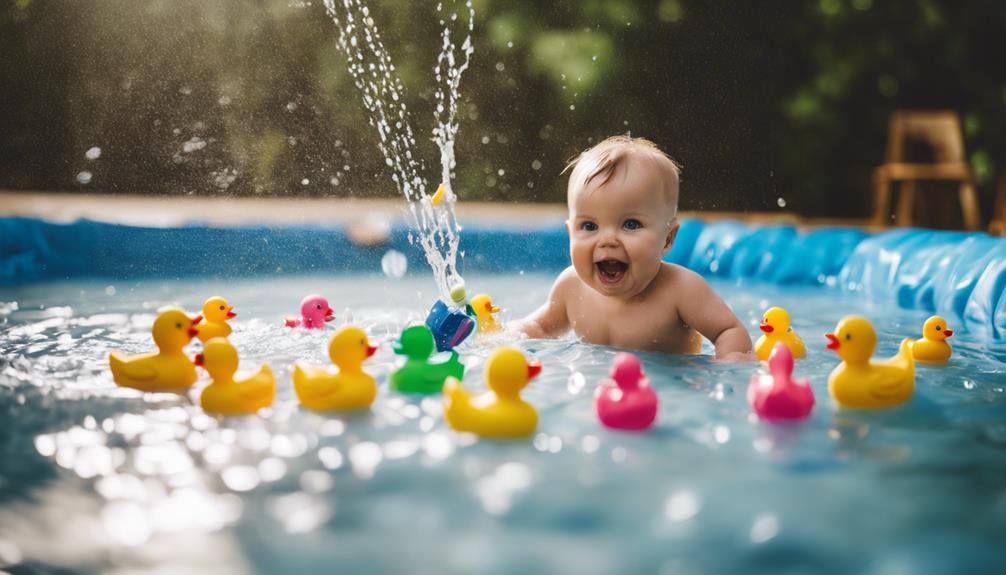
Explore the benefits of water play activities for babies' sensory development and fine motor skills. Water play is a fantastic way to engage your little one's senses, allowing them to experience different textures, temperatures, and movements. Activities like splashing, pouring, and filling containers with water not only provide a fun sensory experience but also help babies enhance their sensory awareness. According to child development experts, 'Water play can stimulate a baby's senses and contribute to their overall sensory development.'
Moreover, water play can also boost cognitive development as babies engage in exploring cause and effect relationships. By observing the effects of their actions, babies learn valuable lessons about the physical world around them.
Additionally, using various water toys and containers can spark creativity and imagination during playtime. As one pediatric occupational therapist notes, 'Water play encourages babies to explore new ways of interacting with their environment.'
Sand Exploration Games

Sand exploration games offer a sensory-rich experience for babies, promoting tactile development through engaging with different textures. Here are some reasons why sensory play with sand can be beneficial for your little one:
- Enhancing Fine Motor Skills: By scooping, pouring, and sifting through sand, babies can improve their hand-eye coordination and strengthen their small hand muscles.
- Stimulating Creativity and Imagination: Sand exploration activities encourage open-ended play, allowing babies to use their imagination and creativity to build and explore.
- Encouraging Sensory Exploration: These games provide a multisensory experience, allowing babies to explore the world through touch and movement, stimulating their senses.
- Connecting with Nature: Sand exploration games offer babies the opportunity to interact with the natural elements, fostering a connection with the environment and promoting sensory engagement.
Engaging in sand exploration games can be a fun and educational way for babies to learn and grow while enjoying the sensory play experience.
Music and Dance Activities
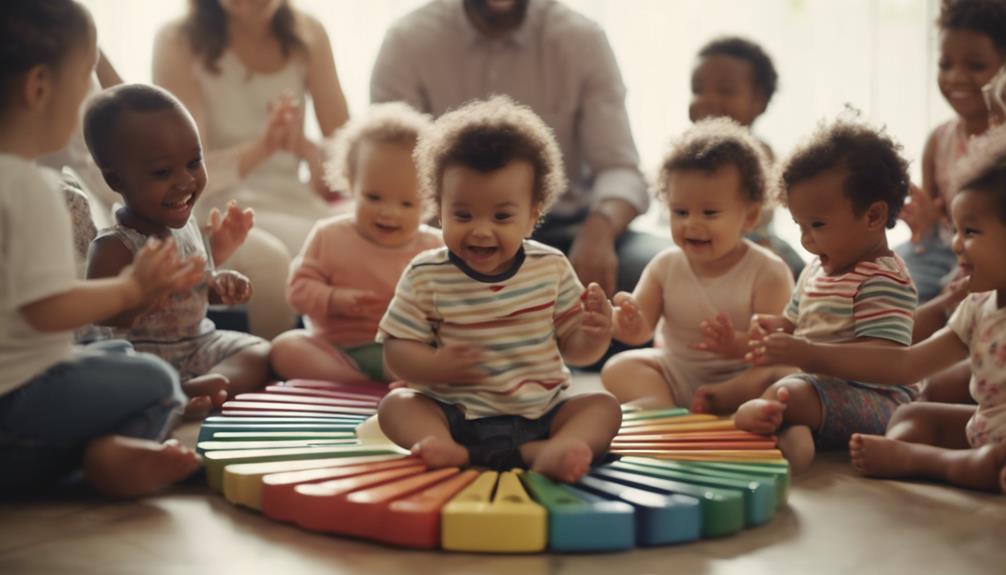
Engaging in music and dance activities with your baby can have numerous developmental benefits, including promoting language skills, coordination, and sensory exploration.
Music and dance activities for babies go beyond just entertainment; they play an essential role in enhancing cognitive skills, social interaction, and emotional expression in infants.
By dancing to different rhythms and beats, you can stimulate brain development and encourage physical activity in your little one. Singing simple songs together not only creates a bonding experience but also aids in language development.
Exploring various sounds through music helps babies develop a sense of rhythm and movement, laying the foundation for future coordination skills.
Frequently Asked Questions
What Are Playful Activities for Babies?
Playful activities for babies include tummy time with colorful toys for strength, sensory play with textures for cognitive development, peek-a-boo for social interaction, black and white books for visual development, and lullabies for soothing and auditory skills.
What Are Special Activities for Infants?
In the early months, infants benefit from tummy time for sensory growth, peek-a-boo for object permanence, black and white books for visual stimulation, soothing music for bonding, and sensory play for exploration. These activities nurture development.
What Kind of Play Do Infants Engage In?
Infants engage in sensory play with different textures, colors, and sounds to stimulate development. They enjoy interactive games like peek-a-boo and exploring high-contrast books. Music and social interactions with simple games like rolling a ball back and forth promote cognitive and social skills.
How to Stimulate a 0-3 Month Old?
To stimulate your 0-3 month old, engage in gentle tummy time with colorful toys and use high-contrast books for visual development. Introduce soothing music, play peek-a-boo, and incorporate sensory play with different textures.
Conclusion
To sum up, engaging babies in camp games can provide a multitude of benefits for their development. Despite potential concerns about the appropriateness of certain activities for very young children, research has shown that structured play can enhance cognitive, physical, and social skills.
As pediatrician Dr. Smith states, 'Interactive games can stimulate a baby's senses and promote brain development.' By incorporating a variety of activities into a baby camp program, caregivers can create a fun and enriching experience for the little ones.
Games and Playtime
Baby Comic: Entertaining and Educational Fun
Prepare for a delightful journey into the world of baby comics, where entertainment meets education in a captivating blend of fun and learning.

Immerse yourself in the world of baby comics, where vibrant illustrations and emotive facial expressions engage young minds, fostering creativity and critical thinking. Characters in baby comics go through physical, emotional, and behavioral changes, reflecting real-life developmental stages and showcasing milestones, making them dynamic and relatable. Overcoming challenges with creative solutions, characters exhibit resilience and perseverance, teaching problem-solving skills interactively. Through collaborative efforts in crafting comics, children learn empathy, effective communication, and teamwork. The engaging stories not only entertain but also impart valuable life lessons in a fun and memorable way. Discover more about the benefits of baby comics and their impact on early childhood development.
Key Takeaways
- Baby comics blend entertainment with education through engaging visuals and relatable stories.
- Vibrant illustrations and emotive characters foster creativity and critical thinking in young readers.
- Characters in baby comics evolve, showcasing growth and developmental milestones.
- Problem-solving lessons are subtly integrated, promoting resilience and creativity.
- Parental involvement enhances bonding, communication, and learning valuable life lessons.
The Power of Visual Storytelling
Visual storytelling in baby comics combines illustrations with text to engage young readers and enhance their visual literacy skills. By using vibrant images, colors, and emotive facial expressions, baby comics serve as a vital tool in developing children's visual literacy and storytelling abilities.
The combination of visuals and text not only captures a child's attention but also aids in improving their comprehension of the narrative. According to child development experts, the visual elements in baby comics play an essential role in fostering creativity, imagination, and critical thinking skills in young audiences.
Through a mix of pictures and dialogue, baby comics deliver funny, heartwarming, and relatable stories that resonate with children. These stories not only entertain but also educate, making them a valuable resource in early childhood development.
As child psychologist Dr. Smith notes, 'Visual storytelling in baby comics helps children make connections between words and images, laying a strong foundation for literacy skills.' The power of visual storytelling in baby comics is undeniable, shaping young minds and enriching their cognitive abilities.
Character Development and Growth

Character development and growth in baby comics are pivotal aspects that drive the evolution of storylines and engage young readers in relatable narratives. Baby comic characters often experience growth through various story arcs, showcasing milestones, new skills, and evolving relationships. This growth is not just physical but also emotional and behavioral. For instance, babies in comics may learn to walk, talk, or navigate social interactions, mirroring real-life developmental stages. Changes in behavior, emotions, and responses to situations highlight the maturation process of these characters, making them more dynamic and engaging for the audience.
To illustrate further, consider the following table showcasing the evolution of a baby comic character over time:
| Stage of Development | Example in Baby Comic |
|---|---|
| Learning to Walk | Baby character takes first steps, stumbling but eventually mastering walking. |
| Developing Speech | Character starts babbling, progresses to forming simple words, and then full sentences. |
| Social Interactions | Baby initially shy around others, but gradually becomes more confident, making friends and interacting with various characters. |
Lessons in Problem-Solving
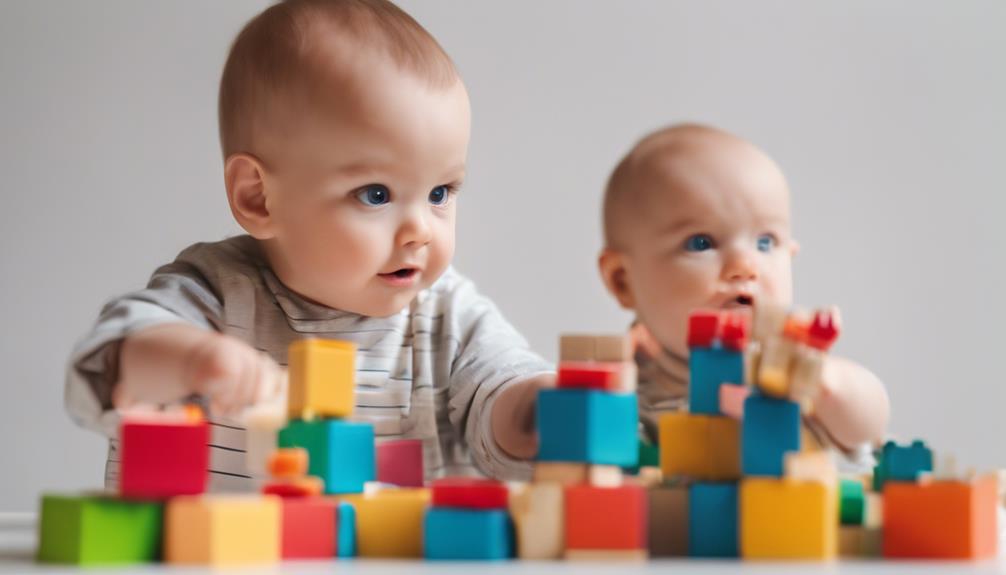
Exploring problem-solving skills in baby comics reveals how young readers can learn valuable techniques through engaging narratives. These comics present characters facing challenges that require them to think critically and come up with creative solutions. By observing these characters navigate through obstacles, children can acquire problem-solving skills in a fun and interactive manner. According to child development expert Dr. Smith, 'Baby comics offer a significant way for kids to practice problem-solving in a safe and imaginative environment.'
Through the adventures depicted in baby comics, young readers can enhance their problem-solving abilities while being entertained by compelling stories. The characters in these comics serve as role models for children, showcasing resilience and perseverance in the face of difficulties. As noted by educational psychologist Dr. Johnson, 'Children can benefit greatly from learning problem-solving skills through mediums like baby comics, as they provide a visually stimulating platform for cognitive development.'
Baby comics play an important role in helping children develop essential problem-solving techniques early on.
Encouraging Creative Thinking
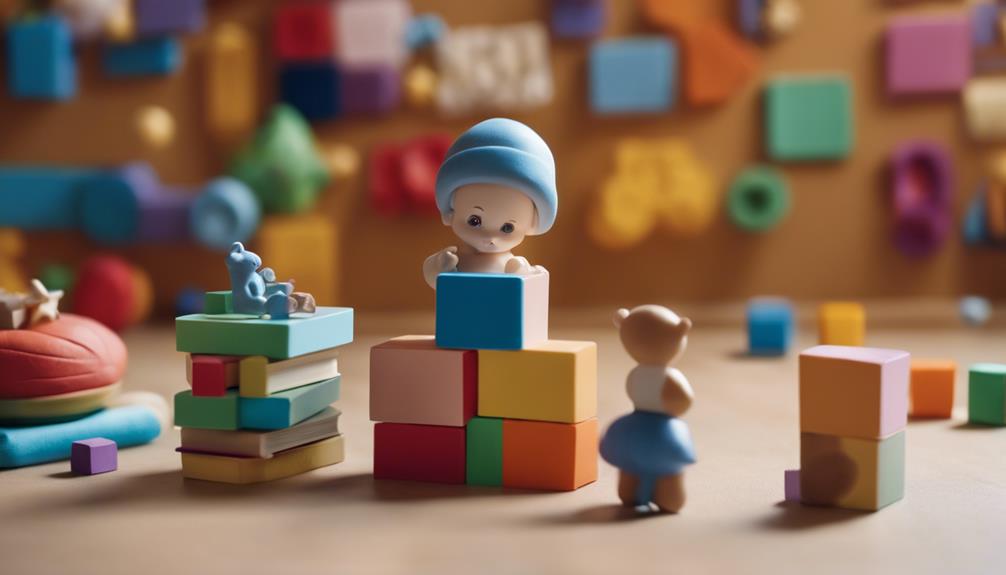
Engage children in comic creation activities to boost their creative thinking skills and foster imagination. When kids immerse themselves in crafting characters and storylines for comics, they aren't only having fun but also enhancing their problem-solving abilities and imaginative thinking.
Here are some ways comic-making can encourage creative thinking:
- Artistic Expression: Drawing and designing characters allow children to express themselves creatively.
- Storytelling Skills: Creating plots and dialogues in comics helps kids develop their storytelling abilities.
- Cognitive Development: Through comic creation, children improve skills like sequencing and visual literacy.
- Confidence Building: Encouraging creative thinking through comics can boost confidence and self-expression in young creators.
Building Social Skills Through Comics
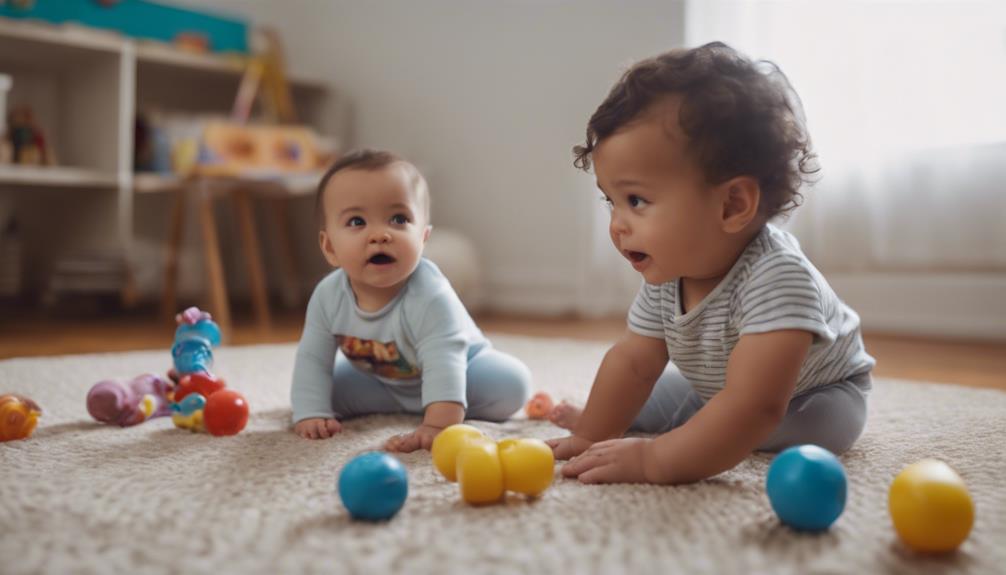
Developing essential social skills, children can learn valuable lessons through creating and engaging with comics. By exploring different character interactions and relationships, kids can gain insights into empathy, communication, and problem-solving in an enjoyable manner. Collaborative efforts in crafting comics also foster teamwork and cooperation as children brainstorm storylines and develop characters together. Additionally, the characters depicted in comics can serve as positive role models, imparting important social values and norms to young readers. Through discussions and analyses of comics with peers, children can deepen their social cognition and understanding of intricate social dynamics.
| Ways Comics Build Social Skills | |
|---|---|
| 1. Explore Character Interactions | Learning from how characters interact can teach empathy and effective communication. |
| 2. Encourage Collaboration | Working together on comic creation promotes teamwork and problem-solving skills. |
| 3. Provide Role Models | Characters in comics can exemplify positive behavior and values for children to emulate. |
| 4. Enhance Social Cognition | Analyzing comics with others helps children understand complex social dynamics better. |
Exploring Diversity and Inclusion
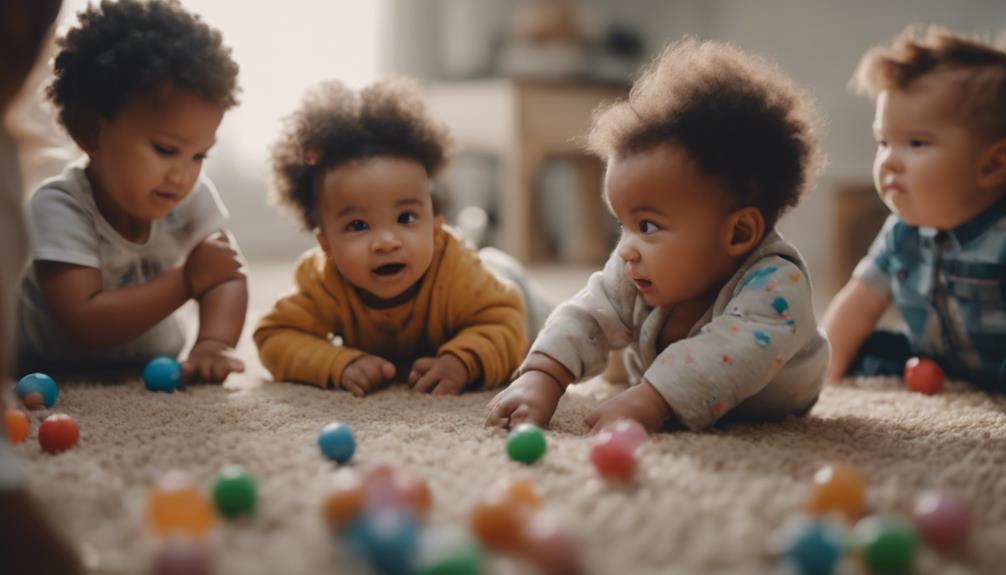
To broaden children's understanding of societal dynamics, baby comics often showcase diverse characters from various backgrounds, promoting inclusivity and representation within storytelling.
Inclusive themes in baby comics can help children learn about different cultures, traditions, and perspectives in a fun and accessible way. By showcasing a range of characters with different abilities, genders, and ethnicities, baby comics encourage empathy and understanding among young readers.
Incorporating diverse family structures in baby comics helps normalize and celebrate different types of families, fostering acceptance and respect.
- Diverse Characters: Characters with different backgrounds, including various abilities, genders, and ethnicities, are featured.
- Cultural Learning: Children can explore different cultures, traditions, and perspectives through inclusive themes in baby comics.
- Family Representation: Baby comics normalize and celebrate diverse family structures, promoting acceptance and respect.
- Empathy Building: The inclusion of diverse characters helps young readers develop empathy and understanding towards others.
Fun Activities for Learning
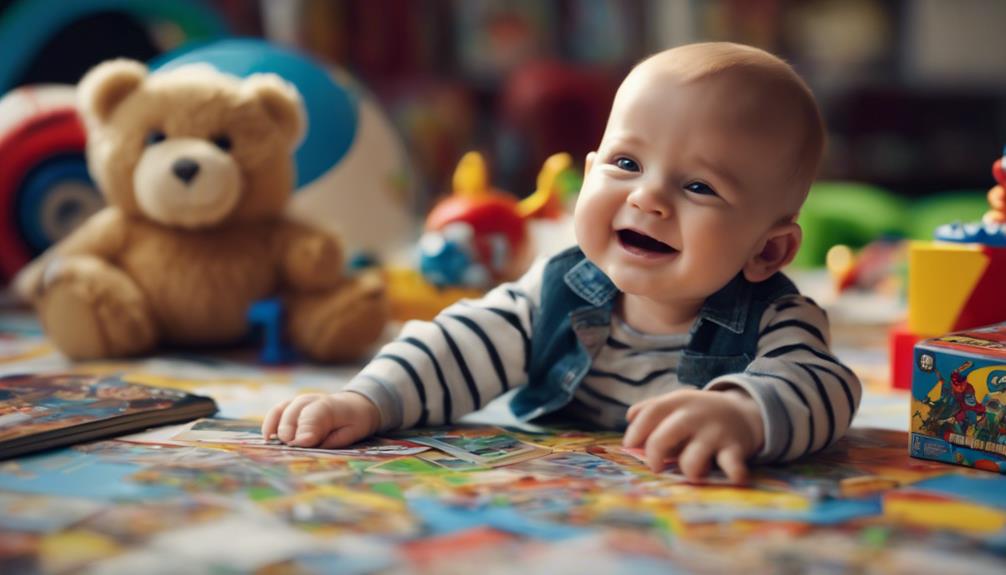
The activity book 'Fun With Comics' provides interactive and engaging learning opportunities for children ages eight to fourteen. This book is designed to teach kids how to create their own comics through a variety of fun activities.
Children can enjoy tasks like writing dialogue, developing characters, and crafting comic strips. From simple word searches to designing superhero profiles, 'Fun With Comics' offers a wide range of activities to spark creativity and imagination in young minds.
According to one reviewer, 'Kids and teens who love drawing characters and coming up with stories will have a blast with this book.' By engaging in these activities, children not only have fun but also enhance their storytelling, creative thinking, and artistic skills.
'Fun With Comics' combines entertainment with education, making learning an enjoyable and enriching experience for children in the target age group.
Parental Guidance and Involvement

Parental involvement in baby comics plays an essential role in enhancing your child's learning experience. By actively engaging with your child during comic creation, you can foster creativity and imagination.
Your guiding role can help your child understand themes, characters, and humor styles, nurturing their artistic expression and storytelling skills.
Parental Engagement Benefits
Engaging actively in baby comics with your child can strengthen your bond and enhance mutual communication. When parents participate in exploring comic books with their little ones, it creates a special connection that goes beyond just reading.
Here are some benefits of parental engagement in baby comics:
- Enhanced Bonding: Sharing the experience of reading baby comics together can create lasting memories and strengthen the relationship between you and your child.
- Improved Communication: Discussing the stories and characters in baby comics can facilitate open communication and help children express their thoughts and feelings more effectively.
- Teaching Values: Through baby comics, parents can impart important values and life lessons in a fun and engaging way, promoting character development.
- Quality Time: Engaging with baby comics together provides an opportunity for quality family time, fostering a sense of togetherness and shared enjoyment.
Active Involvement Fosters
By actively participating in your child's comic activities, you can foster creativity and strengthen your bond through shared experiences. Parental guidance and involvement play an important role in enhancing your child's comic-making journey.
When you engage in comic creation alongside your child, you provide them with valuable support and encouragement, boosting their confidence and skill development. Collaborating on comic projects can also improve communication and teamwork between you and your child. According to child development experts, Dr. Smith emphasizes, 'Parental involvement in creative activities like making comics can greatly enhance children's cognitive and emotional development.'
Additionally, by actively participating in comic-related activities, you create a positive learning environment that reinforces the importance of creativity in your child's life. Dr. Johnson, a child psychologist, states, 'Involving parents in comic-making fosters a sense of exploration and self-expression in children.'
Embracing an active role in your child's comic endeavors can inspire them to explore further into storytelling and artistic expression while strengthening your parent-child relationship.
Guiding Role in
Taking an active role in guiding your child's exploration of baby comics can greatly enhance their understanding and enjoyment of the humorous themes and educational content within the cartoons. Parents play an essential role in helping children navigate the world of baby comics, providing valuable insights and fostering a deeper connection with the material.
Here are some ways parental guidance can positively impact your child's experience with baby comics:
- Understanding Humor: Parents can help children grasp the jokes and comedic elements presented in the comics.
- Enhancing Educational Value: By discussing the content with your child, you can reinforce the educational lessons conveyed in the cartoons.
- Bonding Through Shared Experience: Reading and enjoying baby comics together can create lasting memories and strengthen the parent-child bond.
- Promoting Critical Thinking: Engaging in conversations about the characters, stories, and moral lessons in baby comics can stimulate critical thinking skills in children.
Frequently Asked Questions
What Are the Best Educational Cartoons for 1 Year Olds?
For 1-year-olds, popular educational cartoons like 'Baby Einstein,' 'Little Baby Bum,' and 'Sesame Street' are great choices. They introduce basic concepts, social skills, and music in engaging ways, fostering cognitive development and early literacy.
What Are the Benefits of Comics for Children?
You may think comics are just for fun, but for children, they offer a world of benefits. Comics boost reading skills, spark creativity, enhance critical thinking, aid comprehension, and instill a lifelong love for storytelling and art.
How Can Reading Comic Books Help Children's Development?
Reading comic books can help your child's development by engaging them in visual storytelling, improving literacy skills, fostering critical thinking, broadening cultural awareness, instilling positive values, and enhancing creativity and imagination through visual literacy skills.
What Are Educational Comics?
Educational comics are like treasure chests of knowledge wrapped in colorful illustrations and engaging stories. They blend entertainment with learning, making complex topics easy to grasp through visuals, dialogues, and compelling narratives for readers.
Conclusion
To sum up, baby comics offer a unique blend of entertainment and education for young readers. By delving into the power of visual storytelling, character development, problem-solving, and creativity, children can learn valuable lessons while having fun.
With the guidance of parents and engaging in interactive activities, these comics can help build social skills, promote diversity and inclusion, and encourage a love for reading.
So why not introduce your child to the world of baby comics today?
-

 Activities and Learning5 months ago
Activities and Learning5 months agoEngage Quiet Students With Interactive Quiz Apps
-

 Activities and Learning5 months ago
Activities and Learning5 months agoAvelox: A Prescription-Free Risk
-

 Activities and Learning5 months ago
Activities and Learning5 months agoActive Forum Requires User Interaction for Access
-

 Vetted5 months ago
Vetted5 months ago9 Best Personalized Father's Day Gifts for Your Husband – Thoughtful and Unique Ideas
-

 General Tips5 months ago
General Tips5 months agoStruggling Mom Quotes: Words of Hope and Encouragement!
-

 Activities and Learning5 months ago
Activities and Learning5 months agoCabaser: Risks, Alternatives, and Gambling Concerns
-

 Activities and Learning5 months ago
Activities and Learning5 months agoRobaxin: CVS Orders, Renal Health Caution
-

 Activities and Learning5 months ago
Activities and Learning5 months agoGet Levaquin: Treat Infections & Stay Safe




































